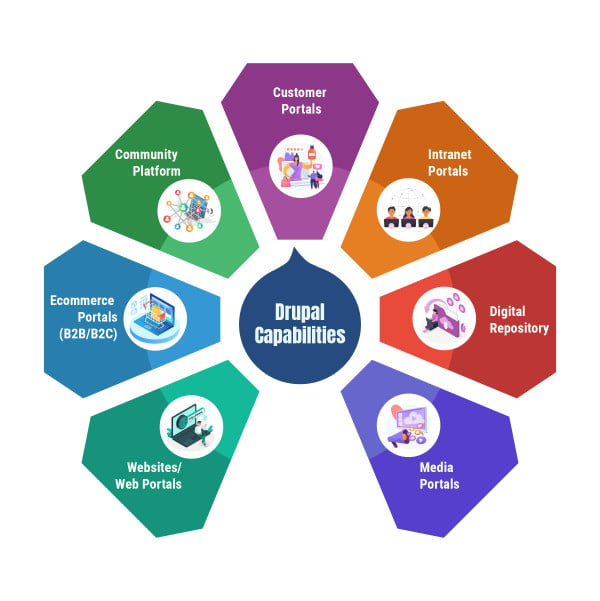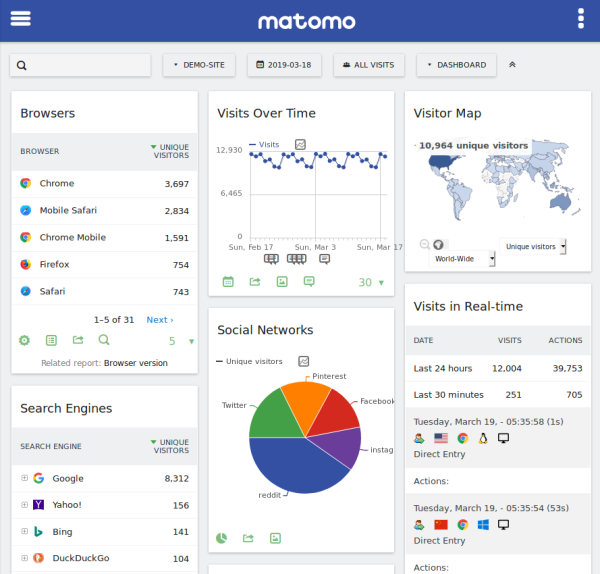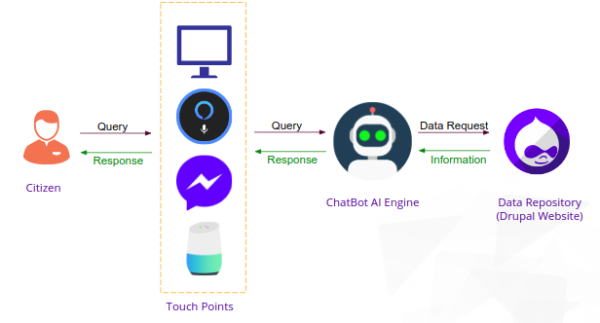Beyond Websites: How DXPs are Redefining Digital Interactions
Reimagining Modern Websites
Modern websites have transformed significantly beyond static pages and basic interactivity. With the seamless integration of mobile and web technology, the goal is to offer immersive and dynamic digital experiences. This evolution is primarily driven by the demands of today's users, who expect a blend of intuitive design, personalized content, and cross-platform accessibility. As a result, the rise of Digital Experience Platforms (DXPs) is evident, aiming to interconnect various technologies to optimize user interactions and engagement.
Digital Experience Platforms (DXPs) - Beyond Basic Websites
Websites are no longer just about information dissemination. DXPs represent the shift towards ecosystems that offer rich, integrated, and personalized user experiences. Tailored to individual preferences and behaviors, DXPs prioritize meaningful engagements, ensuring businesses attain higher ROI.

Drupal is the primary choice for many small and medium organizations looking to build a DXP. Drupal, along with its ecosystem of modules, makes it the best platform for implementing any website business requirements.
Composability - The Modular Approach
Composability is ushering in a new era where websites and platforms are viewed as a collection of interchangeable building blocks. This modular architecture allows for rapid adaptability to market changes and user needs. Businesses can "compose" and re-compose these blocks without affecting the entire system, enhancing agility and scalability.
In the roadmap for Drupal 11 and beyond, composability is a priority. Currently, with modules like ECA (Events - Conditions - Actions), JSON:API, and external tools like Make and Zapier, it is possible to compose and re-compose the DXP built on Drupal to cater to the needs of an agile marketing team.
Prioritizing Mobile Engagement
As mobile traffic eclipses desktops, the importance of responsive design cannot be stressed enough. Using a headless CMS connected with a modern frontend framework like React or NextJS, it's possible to offer a seamless, app-like experience without the constraints of traditional app stores.
Drupal has a robust decoupled/headless ecosystem; headless CMSs built on top of Drupal, like Contenta, and frontend frameworks like NextJS have native integrations with Drupal using NextJS for Drupal.
Immersive Experiences via AR & VR
AR and VR are transforming user experiences, particularly in e-commerce, enabling users to interact with products before purchasing virtually.
Structured content is the basic capability Drupal offers. Coupled with the JSON:API / GraphQL options, it becomes easier to connect a native or web app with the CMS and pull the required information.
Rethinking Content Management with Integration
Modern CMSs serve as communication facilitators, interconnecting tools like CRMs, analytics platforms, and more to ensure a cohesive user experience across the digital spectrum. We have natively integrated Hubspot, OptinMonstor, TypeForm, and many other systems into our website to make it a lead-generation engine. Connecting these tools with Drupal is possible by creating modules or using the API with systems like Make, Zapier, or similar.
Intuitive Search with AI
AI and NLP enhance search functionalities. Nowadays, users expect a semantic search experience on a website instead of the traditional keyword search.
Today's consumers are familiar with semantic search and asking queries in natural language. With integrations with the OpenAI Large Language Model or similar systems, it is possible to implement semantic or even advanced natural language queries to retrieve the required information from a Drupal website.
Hyper-Personalized Content Delivery
AI-driven analytics and integration with Customer Data Portals (CDP) craft content that resonates with individual users, ensuring messages reach them at optimal moments and platforms.
The personalization engine we have implemented is tightly integrated with Drupal and can offer many website personalization use cases. You can experience the possibilities of this system in the detailed demo available here.
Unified Omni-Channel Communication
Consistent and personalized messaging across channels, be it email, social media, or SMS, is essential in our interconnected world. Customer Data Portals, closely integrated with the web CMS, can offer a seamless experience across devices and channels.
Analytics for Strategic Refinement
Advanced analytics tools aren't just about numbers. They provide a comprehensive understanding of user behaviors and preferences, enabling businesses to refine and optimize their strategies continuously. Modern websites are data-driven, and properly tracking visitors' interactions in a privacy-optimized manner is critical to any website's success.

Integrating tightly with Google Analytics or privacy-focused alternatives like Matomo or Plausible, users' interactions can be captured and used to further optimize the user experience on the website. One example is the internal search, which can offer insights into what users expect from the website if we properly track user interactions with the search.
Data Integrity and Trust
With data privacy laws becoming more stringent, the onus is on websites to guarantee the safety and integrity of user data. Adhering to global standards like GDPR and CCPA is more than a mandate; it's about building user trust.
Drupal can be your ally if you want to build a privacy-first DXP. It can seamlessly integrate with privacy-first CDPs like Unomi and cookieless web analytics tools like Seal Metrics.
Chatbots - Revolutionizing Customer Interactions
AI-driven chatbots have transcended from being mere query solvers. They personalize interactions, aid decision-making, and streamline the user journey from inquiry to purchase.

Tools like DialogFlow have been around for a while and can be integrated with Drupal. Now, these tools offer generative AI support that makes interactions more natural. You can use Free and Open Source tools like Rasa if cost is a concern.
Conclusion
Modern websites are evolving into dynamic Digital Experience Platforms (DXPs) to meet user demands. These DXPs, driven by user expectations, seamlessly integrate technologies, prioritize personalization, and offer multi-channel consistency, setting a new standard for online interactions. As businesses increasingly rely on these platforms to achieve greater engagement and ROI, the emphasis on user-centric, agile, and secure digital experiences will only become more pronounced in the future.



